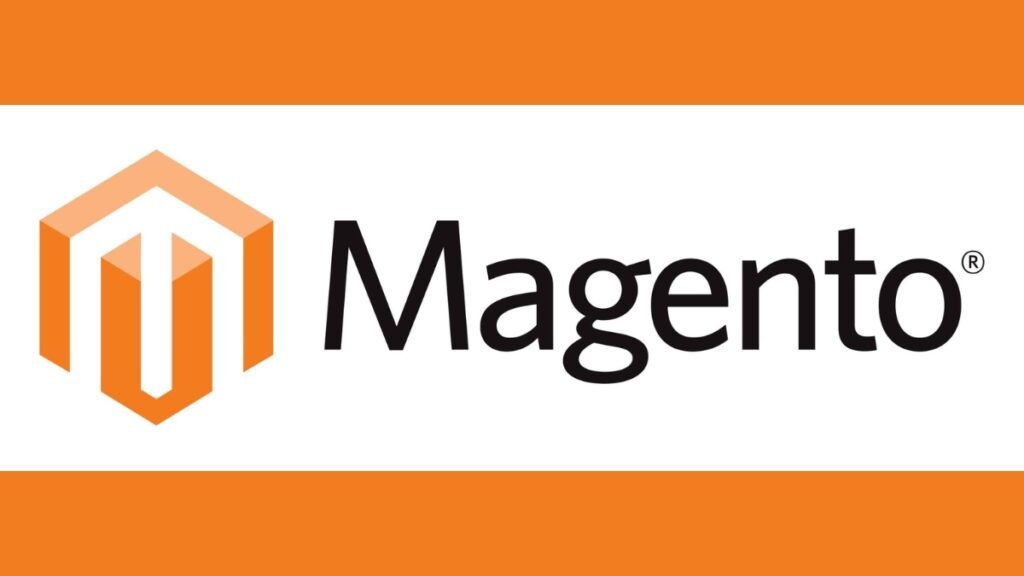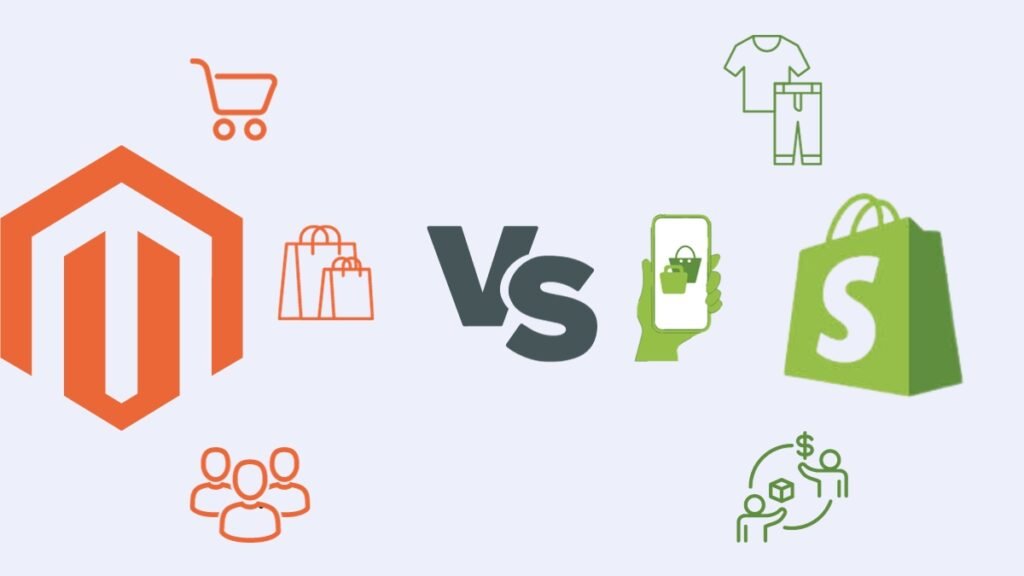Understand e-commerce excellence: Magento vs Shopify. Choose your e-commerce platform for online success. Explore, decide, and take your business to new heights.
A wide range of e-commerce platforms are available for entrepreneurs to start an online business, sell products and services, and process orders. The two most prevalent choices are Magento (Adobe Commerce) and Shopify. Both of these platforms provide different e-commerce experiences with major differences in certain aspects. It is important for business organizations to thoroughly assess various aspects prior to selecting the most appropriate e-commerce platform.
In this blog, we will carefully compare Magento and Shopify to help you choose the best platform for creating your e-commerce website. Let’s get started!
What is Magento (Now Adobe Commerce)?
Magento, which is now known as Adobe Commerce, is an open-source e-commerce platform that has many features and flexibility designed for large-sized enterprises. The platform has a range of options that help businesses tailor their online store to meet specific needs.
Magento is a great choice for big companies looking to sell their products online. It delivers great performance and security, together with a flexible approach. It allows store customization. Sellers can easily differentiate their businesses from the competition by using Magento to develop original, non-plagiarized content.
| Interesting Facts about Magento: |
|---|
| – Magento was in the top five shop software providers in the United States in 2020 (Statista). – Adobe acquired Magento for 1.68 Billion (Tech Crunch). – Over 770,000 merchants use Magento (builtwith) – Popular websites include: Coca-Cola, Tommy Hilfiger, Nike |

Features:
- Flexible shopping cart system.
- Support for several languages, delivery options, payment gateways.
- Variety of tools and services related to marketing, SEO, and catalog management.
- Improved browser caching for static content.
- Enterprise-grade database scalability.
Strengths:
Large User Base
The Magento Forum , which has over 300,000 users, provides nearly all the answers to every issue you may possibly have.
Perfect for Enterprises of all Sizes
Magento is a powerful e-commerce platform. Businesses with an in-house web development team or the financial means to employ web developers can benefit from Magento.
Weaknesses:
Less ways to Contact Customer Support
Magento does not offer live chat or email support. Business owners can still contact them via call for any kind of help and technical assistance.
Not Appropriate for Newbies
To utilize Magento, you must be skilled in coding and understand technical words because the platform employs web developer terms.
What is Shopify?
Shopify is an e-commerce platform that simplifies the creation of online retail shops. The platform is designed to support organizations of all sizes, including startups and larger companies. It comes with a wide range of pre-installed features and an easy-to-use UI.
Shopify is an extensive platform for online shopping that allows you to launch, expand, and run a company. The experiences of millions of sellers on the platform have contributed to its leadership and expertise in the field of commerce. With Shopify, businesses can create and customize an online store and sell through a variety of channels. This includes channels such as social media and online marketplaces, as well as online, mobile, in-person, brick-and-mortar, and pop-up stores.
| Interesting Facts about Shopify |
|---|
| – Shopify’s revenues for the 2020 second quarter rose 97% to $714.3 million, compared to the same period a year ago (Business Wire). – Shopify is being used by sellers in over 175 countries around the world (builtwith). – Shopify had a gross merchandise volume of $197.2 billion (Shopify). – Popular websites include: Heinz UK, Lindt, Fitbit |

Features:
- Shopify is entirely hosted and cloud-based.
- Users can access and manage their business from any location with an internet connection.
- It has several tools such as store templates, tools for online and offline sales, integrated payment processing, the highest converting online checkout, SEO features, marketing tools.
- Access to Shopify APIs and development tools to further customize the features of the store.
Strengths:
Customer Service
Customer service is available to Shopify users around the clock via a variety of channels, including phone, email, chat, and more.
Simple to Use
Shopify is the best option for less tech-savvy entrepreneurs who are not familiar with coding.
Weaknesses:
Price of Extensions and Apps
Shopify is less expensive than Magento. You can install more extensions and apps that you need. This might soon mount up in your bills.
Magento vs Shopify: A Quick Review
| Aspect | Magento | Shopify |
|---|---|---|
| Ownership and Pricing | Adobe Commerce is owned by Adobe and is typically more complex and customizable. Pricing may vary based on business needs. | Shopify is a standalone platform with a subscription-based pricing model. Offers different plans to cater to various business sizes. |
| Ease of Use | Magento tends to have a steeper learning curve due to its extensive customization options and feature-rich nature. | Shopify is known for its user-friendly interface, making it easier for beginners to set up and manage their online stores. |
| Scalability | Magento is highly scalable and is better suited for large and complex e-commerce operations. | Shopify is scalable and caters to businesses of all sizes, but it may have limitations for extremely large enterprises. |
| Customization | Magento provides extensive customization options, making it suitable for large enterprises with complex requirements. | Shopify offers customization through themes and apps, making it easier for small to medium-sized businesses. Custom coding is also possible for advanced users. |
| App Ecosystem | Magento has a robust extension marketplace for additional features and functionalities. | Shopify has a large app store offering a wide range of third-party apps to improve store capabilities. |
| Themes and Templates | Adobe Commerce offers a range of themes, and users can create a highly customized designs. | Shopify has a variety of themes available, and users can customize them to a certain extent, with a simpler process compared to Magento. |
| Security | Magento is known for its robust security features but requires proper configuration and updates. | Shopify takes care of security measures, including SSL certificates and PCI compliance, providing a secure environment for users. |
| Hosting | Adobe Commerce can be hosted on-premises or on cloud services like Adobe Commerce Cloud. | Shopify has a fully hosted solution, and users don’t need to worry about hosting or server management. |
| Community Support | Magento has a large and active community, providing support through forums and documentation. | Shopify also has a strong community and offers support through documentation, forums, and customer support. |
| Payment Gateways | Magento supports multiple payment gateways, and users have flexibility in choosing their preferred options. | Shopify supports a wide range of payment gateways, and additional gateways can be integrated through apps. |
| SEO Capabilities | Magento provides strong SEO capabilities with customizable URLs. metadata, and other features. | Shopify has good in-built SEO features and additional SEO improvements can be made using apps and customization. |
| Mobile Responsiveness | Adobe Commerce allows for responsive design, making sure a good user experience on mobile devices. | Shopify themes are mobile responsive by default; offering a seamless experience across different devices. |
Read more:
- Website Selling vs Online Marketplaces: Which is Better?
- ShipRocket vs Pickrr: A Detailed Comparison
Magento vs Shopify: What’s the Difference?

After reviewing the two platforms, let’s see how they stand up against one another. The first and foremost difference is the manner in which the platforms are hosted. Shopify is a hosted platform, so you do not have to worry about managing the hosting of your website. Magento, on the other hand, is an open-source platform that needs website hosting. Hence, it takes additional processes and a level of sophistication before a merchant can launch their store.
The second main difference is about the features and capabilities provided by each platform. Shopify is more user-friendly and simple to use. Its feature set and customization choices are more limited. On the flip side, Magento is complicated, but it also has some more sophisticated capabilities and customization choices.
Both platforms also differ in terms of their pricing strategies. Magento is often more expensive. Shopify offers flexible pricing options with many options to pick from based on a business’s requirements.
Let’s study the differences in detail.
Magento vs Shopify: Website Development and Coding
- Magento and Shopify differ greatly in the level of coding and web development experience required. Shopify employs its own language called Liquid, whereas Magento uses PHP. PHP is a popular server-side programming language that is utilized by web developers for e-commerce worldwide. Written by Ruby, Liquid is an open-source template language developed by Shopify. It serves as the foundation for Shopify themes and loads dynamic information into shops.
- Programming languages that are excellent for e-commerce sites are PHP and Liquid. PHP is a widely used open-source language for web development due to its flexibility and broad feature set. A template language called Liquid is used to create dynamic web pages and customize existing ones. It is a safe language that makes it simple to alter a website’s style without touching the code.
- The ideal programming language for your online store will ultimately be based on your unique needs. To set up your store from the beginning, Magento takes far more technical experience than Shopify. It is suggested that e-commerce businesses hire a web development team. Even though setting up a basic Shopify site just requires a little coding experience, it is suggested to hire an expert web development team to stand out from the competitors.
Magento vs Shopify: Pricing
- Magento has a variety of options, ranging from the Community Edition, which is free, to the Enterprise Edition, which costs $18,000 annually.
- Shopify has a range of pricing options: the Basic plan costs $39 per month, the Standard plan is $105 per month, and the Advanced plan is $399 per month. It is available to business clients for $2,000 per month.
- The higher your spending level, the more advanced the features are throughout the various plan packages. E-commerce businesses can select more costly or less expensive options based on their budget and revenue. In terms of total cost, Shopify excels over Magento, as its various plans are more reasonably priced. Web hosting expenses are reduced, and transaction fees for payment gateways are lower when using Shopify (if utilizing Shopify Payments).
Magento vs Shopify: Features
- Magento and Shopify offer basic store features. They are both user-friendly and updated. Common features include shopping carts, checkout modules, collections, and product pages.
- The main difference is that Magento has basic and elaborate features on its platform. More features are accessible via an external app when using Shopify. By using modern technology, a new level of e-commerce experience can be explored. There are a plethora of apps on the Shopify app store.
- Magento’s marketplace provides the majority of its marketing resources. For example, you will need to install extensions like Remarkety in order to start email campaigns. Also, Shopify provides plenty of built-in marketing tools to help your business expand, but if you truly customize features, you will probably need to depend on a web developer’s skills to connect your marketing tools.
- With over 8,000 accessible apps as of 2023, Shopify offers a greater range of possible features and developments overall thanks to the Shopify App Store.
Magento vs Shopify: Payment Gateways
- In online stores, payment gateways and processors provide the groundwork for each transaction. Merchants are unable to accept and handle consumer payments and the associated transaction data without payment gateways.
- Magento accepts payment via PayPal, Authorize.net, Braintree, and a few more third-party companies. Magento does not have a combined point-of-sale system.
- On the other hand, Shopify gives customers and operators of online stores a great deal of freedom by combining with more than 100 payment providers. It is important to keep in mind that a few demographic groups in some countries tend to favor unique payment methods over others. Also, many customers find it convenient to utilize payment processors that they already have set up.
- Even though Shopify has a wider selection of payment gateways than Magento, it is still important to consider transaction costs while utilizing payment platforms because some might be more expensive than others. Shopify has an integrated payment system, Shopify Payments, which has no transaction fees.
Magento vs Shopify: Content Management Systems
- Magento has an outstanding content management system. With a WYSIWYG editor, it supports a variety of content types and is a simple to use page builder. It can effortlessly manage a huge variety of items and is very expandable. Magento is a fantastic option for launching an online store, as it also provides strong content management features.
- Using Shopify’s constantly growing set of e-commerce Content Management System (CMS) tools, you can create, modify, manage, and publish content. Additionally, it offers functions like multilingual language management and SEO-friendly content blogging, both of which are crucial for ranking on search engines like Google and Bing. But Shopify’s content management system is not best suited for sites with a lot of material, blogs, manuals, or rich content. It is unable to meet all of the content needs that modern businesses have.
Magento vs Shopify: Shipping and Inventory
- Shipping and inventory control are essential to the success of physical product sales via online retailers.
- Magento has a simple inventory management system. This platform provides unique and advanced features. Magento offers more advanced options for managing inventory and orders. You can add custom fields to the checkout process and build an infinite number of product kinds and categories with its extensions and custom solutions.
- Shopify offers strong point-of-sale (POS) software that includes staff management, uniform analytics, and inventory monitoring. Shopify allows merchants to monitor inventory levels and get thorough sales statistics.
- Both of these systems offer strong and flexible shipping charge-calculating options. Shopify also integrates with other dropshipping services (such as delivery estimates) and more accurate shipping calculators if you want to provide your customers with the most exact information available.
Magento vs Shopify: Conclusion
Magento and Shopify both provide unique and different options for setting up and running your business. The decision between Shopify and Magento eventually comes down to your requirements and objectives. Shopify is user-friendly. Magento provides more customization and marketing choices. Magento is a bit more complex but also provides more advanced features and customization choices. Shopify is more straightforward, easier to use, and has a reasonable price structure.
If you are a big enterprise and in need of more customization and advanced functionality, Magento could be a better fit. If you are a small company owner searching for a user-friendly platform with reasonable pricing options, Shopify is a better choice.
We hope this blog post has helped you understand both e-commerce platforms and make a smart decision for your business!
FAQs
Why Magento is the best e-commerce platform?
Magento allows you to customize in addition to providing scalable and adaptable e-commerce solutions. It also gives you the ability to expand your platform in order to produce unique and differentiating branded experiences.
Is Shopify best for e-commerce?
Shopify is the best platform for your e-commerce needs. Self-hosted software with tools to manage every element of retail, from website design to quick shipment enables you to sell wherever your consumers are. Shopify retailers can observe all of their activity from a single back office.
Which e-commerce type is the most successful?
The B2C model, which adheres to the conventional retail paradigm, is the most successful kind of e-commerce.





